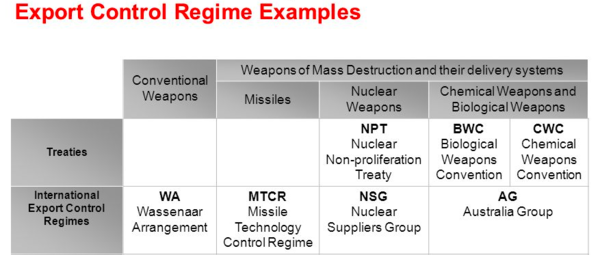Why in News?
In last 1-year India has become the member of Australia group and the Wassenaar group

India Joins the Australia Group
- India has admitted as the 43rd member of the Australia Group
- The group is an informal bloc of countries that keep a tight control over exports of substances used in the making of chemical weapons
The Australian Group
- The Australia Group is a multilateral export control regime (MECR) and an informal group of countries (now joined by the European Commission) established in 1985 (after the use of chemical weapons by Iraq in 1984) to help member countries to identify those exports which need to be controlled so as not to contribute to the spread of chemical and biological weapons
- The group, initially consisting of 15 members, held its first meeting in Brussels, Belgium, in September 1989.
- With the incorporation of India on January 19, 2018, it now has 43 members, including Australia, the European Commission, all 28 member states of the European Union, Ukraine, and Argentina
- The name comes from Australia’s initiative to create the group. Australia manages the secretariat
- The initial members of the group had different assessments of which chemical precursors should be subject to export control
- Later adherents initially had no such controls
- Today, members of the group maintain export controls on a uniform list of 54 compounds, including several that are not prohibited for export under the Chemical Weapons Convention but can be used in the manufacture of chemical weapons
- In 2002, the group took two important steps to strengthen export control
- The first was the “no-undercut” requirement, which stated that any member of the group considering making an export to another state that had already been denied an export by any other member of the group must first consult with that member state before approving the export
- The second was the “catch-all” provision, which requires member states to halt all exports that could be used by importers in chemical or biological weapons programs, regardless of whether the export is on the group’s control lists
- Delegations representing the members meet every year in Paris, France
Significance for India
- With its admission into the Australia Group, India is now part of three of the four key export control groups in the world
- This includes the Missile Technology Control Regime, the Wassenaar Arrangement. The only export control group that India is not a part of is the elite Nuclear Suppliers Group (NSG)
- Series of multilateral export control groups that India has joined “helps in establishing our credentials” for joining the NSG.
- Joining the Australia Group would also help in “strengthening supply chain security in the dynamic industry fields of biotechnology and chemicals”, along with meeting non-proliferation objectives.
India joins the Wassenaar arrangement
- Elite export control regime Wassenaar Arrangement (WA) has decided to admit India as its new member
About Wassenaar Agreement
- The Wassenaar Arrangement was founded in 1996
- Its stated aim is “to contribute to regional and international security and stability, by promoting transparency and greater responsibility in transfers of conventional arms and dual-use goods and technologies, thus preventing destabilizing accumulations.”
- Its (WA) member countries are required to ensure that transfers of these items do not contribute to the development or enhancement of military capabilities which undermine these goals. The aim is also to prevent the acquisition of these items by terrorists.
- New members are accepted based on specific criteria, including countries which produce/export arms or associated dual-use goods and technologies; establish national policies that restrict sale of arms and sensitive technologies to countries of concern; and adhere to non-proliferation regimes.
- It is clubbed with mechanisms such as the Nuclear Suppliers Group (NSG), the Missile Technology Control Regime (MTCR) and the Australia Group
- It comes on the heels of membership last year of the MTCR.
Why did India get membership of Wassenaar Arrangement?
- Even though India is not a signatory to the Non-Proliferation Treaty, it has managed to make its entry into the Wassenaar group.
- India has managed to do that by updating its export control lists earlier this year, to bring it in line with international standards, including those required by the Wassenaar Arrangement.
- To be precise, India approved SCOMET (Special Chemicals, Organisms, Materials, Equipment, and Technologies) items, mandatory under the Wassenaar Arrangement. Through the revised list of items, India also seeks to send a message about its larger commitment to non-proliferation.
Significance for India

- Boost international image: India’s formal entry into this group would further boost its image in the international arena.
- Enhance its credentials in the field of non-proliferation: Even though India is not a signatory to the Non-Proliferation Treaty, it has managed to make its entry into the Wassenaar group, which would enhance its credentials in the field of non-proliferation.
- India has built strong for NSG: With this development, India’s has built a strong case for its entry into the Nuclear Suppliers Group (NSG), which was opposed by China last year
- Facilitate high technology tie-up: It will also facilitate high technology tie-ups with Indian industry and ease access to high-tech items for our defence and space programmes. It will also create grounds for realignment of India in export control policy framework of other WA members, including eligibility for certain licensing exceptions.
- Enhances India’s chance to be member of UNSC: Being a responsible state in the international system, India is eyeing to play a more proactive role globally. Being a part of major groups like WA enhances India’s chances to get a permanent seat in United Nations Security Council in future.


